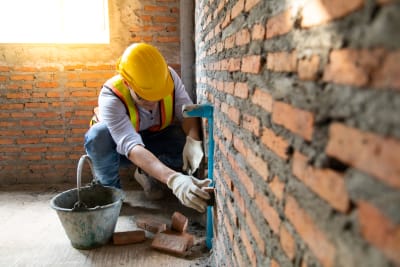Anyone who likes to work with their hands, particularly fabricating naturally occurring materials into beautiful structures with real-world purposes, will enjoy a career in masonry.
Luckily, the path to starting a career as a masonry worker in Hawaii is relatively straightforward, and the yearly salary is worth it.
One of the significant things needed to start the journey is to become familiar with essential steps and other critical information, such as state licensing requirements and potential salary.
Thankfully that is exactly what this article is about. Below you’ll find all the information you need to start your path to becoming a successful mason in Hawaii and the best career paths to consider.
How to Become a Masonry Worker in Hawaii
Below are the general steps involved in becoming a masonry worker in Hawaii.
Step 1: High School Diploma and GED
A masonry worker needs to be trained in the craft, but they must enroll in a training program before they can do so. Incidentally, doing so always requires them to have at least a high school diploma or GED.
They can move on to the next step after this step is fulfilled.
Step 2: Training Program
When training to become a masonry worker in Hawaii, individuals have two alternative routes to obtain it. The first route is to directly seek employment and receive training on the job, while the second route is to attend a formal training program and then seek employment afterward.
On-the-job Training
On-the-job training is possible for masonry workers in Hawaii because the government still needs to set a minimum educational requirement for the job. High school diplomas and GED are only requirements simply because training programs and employers like to ask for them.
With college and trade school training, however, employers are more lenient. Companies are sometimes eager to train workers on the job to bring them up in the specific tenets of their company.
Those who are changing careers from a related construction profession may also choose to go directly for training on the job.
Apprenticeship Programs
This can be done in one of two ways regarding receiving formal training before employment. The first way is to enroll in an official apprenticeship program.
Apprenticeship programs differ from direct employment training because even though apprentices learn on the job, they are technically only employed once they complete their apprenticeship programs.
Technical School Programs
The second option for obtaining formal training in masonry before seeking employment is to enroll in a technical school. Community colleges and vocational schools offer a few of these programs in the state.
Training school programs bring students to an environment that facilitates a solid theoretical knowledge of the field, sprinkled with hands-on training.
Step 3: Specialization
While masonry workers are usually classified as masons, there are a few areas of specialization that professionals often have to choose when they are done with training.
Below are some of the most popular of these specialty areas:
- Stonemasons - Stonemasons are masonry workers whose primary concern is fabricating And repairing structures made of stone, naturally occurring rocks such as marble and limestone, or artificially created ones.
- Brick masons - Brick Masons or bricklayers work with bricks, blocks, and terracotta.
- Terrazzo Mason - A terrazzo worker or terrazzo Mason builds structures such as floors and walkways from terrazzo.
- Cement Masons - Cement masons work with concrete. They are experts at building things with concrete and incredibly knowledgeable about ensuring that the concrete materials aren’t affected by external conditions.
Consider Trades with Similar Paths:
State License and Certifications
After completing their training and choosing an area of specialization, the next thing to do for a masonry worker in Hawaii is to become licensed. This requirement is mandatory for all masons in the state.
The license in question is the C-31 Masonry Contractor License needed to acquire permission to lay bricks and other baked products in the state. To obtain the license, candidates must take a masonry licensing exam consisting of 60 total questions.
The passing score is at least 75%, and the exam can be completed in 120 minutes. Candidates must also pass a second examination, the business law exam consisting of 80 questions.
The time allowed for this exam is 180 minutes, and candidates must score at least 75% to pass.
Top Masonry Schools in Hawaii
The following are some of the most notable alternatives for future masonry workers in Hawaii to consider.
Honolulu Community College
Honolulu, HI Online + Campus
Honolulu Community College offers top-quality masonry training incorporated as part of its construction and mechanical trades department. This program's participants learn about various construction topics, including building maintenance and bricklaying masonry.
Tuition
$131 - $345 per CreditContact
(808) 845-9211
honcouns@hawaii.edu
Hawaii Community College
Hilo, HI Online + Campus
Hawaii Community College also offers a masonry training program focusing on concrete technology. The topics taught here include hands-on concrete flatwork, plastering, cement finishing, and more.
Tuition
$3,204 - $8,340Contact
(808) 934-2500
hawccar@hawaii.edu
BAC Local 1
Honolulu, HI Online + Campus
Future masonry workers in Hawaii who wish to receive their training from an apprenticeship program may consider enrolling in the program offered by the Union of Bricklayers and Allied Craftworkers Local 1 in Hawaii.
Tuition
FreeContact
(808) 841-8822
askbac@bacweb.org
Explore Masonry Schools by City:
Masonry Worker Salary & Job Outlook in Hawaii
A masonry worker in Hawaii can look forward to an annual average salary of $54,204, significantly above the national average. Those who fall into the top 10% earn as high as $69,892, while those who fall into the bottom 10% earn an average annual salary of $41,882.
Hilo and Honolulu masons earn the highest average salary in the state, with annual figures of $53,054 and $48,174, respectively.





